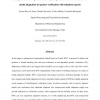Free Online Productivity Tools
i2Speak
i2Symbol
i2OCR
iTex2Img
iWeb2Print
iWeb2Shot
i2Type
iPdf2Split
iPdf2Merge
i2Bopomofo
i2Arabic
i2Style
i2Image
i2PDF
iLatex2Rtf
Sci2ools
SPEECH
2008
2008
Unsupervised intra-speaker variability compensation based on Gestalt and model adaptation in speaker verification with telephone
In this paper an unsupervised compensation method based on Gestalt, ISVC, is proposed to address the problem of limited enrolling data and noise robustness in text-dependent speaker verification (SV). Reductions in EER and in the integral below the ROC curve as high as 20% or 40% and 30% or 60%, respectively, can be achieved by ISVC independently of the number of enrolling utterances. In contrast to model adaptation methods, ISVC is memoryless with respect to previous verification attempts. As shown here, unsupervised model adaptation can lead to substantial improvements in EER but is highly dependent on the sequence of client/impostor verification events. In adverse scenarios, such as massive impostor attacks and verification from alternated telephone line, unsupervised model adaptation might even provide reductions in verification accuracy when compared with the baseline system. In those cases, ISVC can even outperform adaptation schemes. It is worth emphasizing that ISVC and unsupe...
SPEECH 2008 | Text-dependent Speaker Verification | Unsupervised Compensation Method | Unsupervised Model Adaptation |
| Added | 15 Dec 2010 |
| Updated | 15 Dec 2010 |
| Type | Journal |
| Year | 2008 |
| Where | SPEECH |
| Authors | Néstor Becerra Yoma, Claudio Garretón, Carlos Molina, Fernando Huenupán |
Comments (0)

